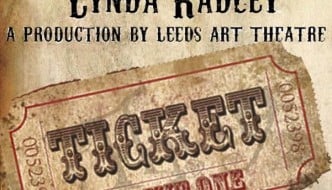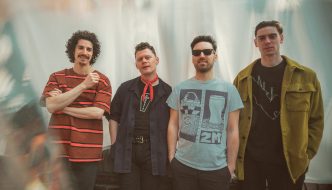
It’s a nerve-wracking five minutes as this interviewer ping-pongs between the disparate denizens of Belgrave’s mid-sound-check Music Hall in search of the elusive ‘Joe’, ostensibly in charge of whisking me backstage to meet the evening’s headline. Anonymous Records-signed electronic duo Polo are triggering samples on the stage while I get rebuffed by the third not-Joe in the room. I elect to watch them until another candidate for prospective Joe-ness presents themselves.
The night is the second of seven dates across early winter and the western hemisphere for Victoria Hesketh a.k.a. Little Boots, as her and her on-stage ‘colleagues’ work fastidiously to tour third album Working Girl. Shortly after we take a shabby-chic seat in her second dressing room of the month (myself having successfully navigated my way to a ‘Joe’ that did the trick), I bring up the relative sparseness of the tour’s dates and locations. “I haven’t done huge UK tours for a long time really… I seem to have a small, but very dedicated fan-base, and they’re spread all over the world. You can’t stretch that far, really.”
Leeds is perhaps a unique hub in that sense. Her hometown not so far away, and her first perhaps her first forays into popular music with formative electro band Dead Disco, Leeds might be considered a locus for what would eventually become the internationally successful sound of Little Boots. I ask if she might regard playing in Leeds a homecoming of sorts. “Maybe, in a way… It’s always changing though. The turnover in the city is so high. There are always new blocks of flats or shopping centres.”
Working Girl features production credits from a formidable thirteen, including the likes of Com Truise (‘Business Pleasure’) and Ariel Rechtshaid (‘Better In The Morning’). “I just like collaborating with people. I always get excited by other people bringing stuff to the table. If I work with the same person all the time, I think it would stop pushing me into new places. I’m constantly trying to marry these worlds of super-pop music and super-weird electronic music – some people go for it, and some people don’t!”
It doesn’t bear much repeating, the likely source for Hesketh’s business-chic aesthetic and album concept. On Repeat Records is Hesketh’s independent label, from which she’s released the last two of her albums, as well as singles and E.P.s from Tom Aspaul and Camden Cox. Compared to her prior experience as performer-part of the much larger major label machine, running relatively small record label On Repeat with a skeleton staff and budget has been much more work of a very different kind.
In talking about potential new signings, Hesketh reveals one stressful part of the independent whole: “We wanted to do an album for an act I really believed in, but we didn’t get the backing to do it, which was frustrating for me. Then I’ve been putting my stuff out, which, for such a small team, takes all the time. If we do something, we have to really love it, because it’s all of our manpower, all of our time, energy, money – and I haven’t found anything I really love enough at the minute, between my own stuff. I really hope that I do. I listen to everything we get sent demo-wise, and I’m just hoping we find that magic.”

The back-end workings of the record industry are a particularly prescient topic in general, let alone for this independent label head of nearly three years – it was the confines of an A-list mentality that drove Little Boots away from that daunting major-label machine in the first place – making the turning of our conversation to the state of things industry-wise near-inevitable. I ask how she thought things might progress in the music industry, from her position as independent producer artist and label.
“I wish I knew what was going to happen. It’s changed, unbelievably so, from when I was in my first band to now. I feel like something needs to happen. Unless you’re Adele or Taylor Swift and you’re so huge that you can say ‘Spotify, I’m not going to put my album out through you’, unless you have that kind of power, it’s very tough for independent artists to get off the ground,” she says.
With Adele’s latest album 25 out last month, and with the incredible statistics behind just how popular it is despite its absence from popular streaming services, Hesketh has an unfortunate point. The right backing and the right money maketh success, where independent musicians are left with little choice but to accept the pittances afforded to them by the bottom end of that very system: the meagre returns of Spotify royalties and YouTube adverts. It’s not as bad as it was in the seventies, but goodness knows it’s bad. She offers a much-needed reminder, though: “Music will always be cool, and people will always want music. Someone just needs to figure out a new way to make that work for the artist and the consumer. It’s good that the middlemen are getting cut out of the industry, but it doesn’t quite seem to be working yet.”
Despite her avoidance of that first-person pronoun, Hesketh may well be that ‘someone’. The industry issue has obviously been weighing down on her and her label increasingly in recent times, as she shares her thoughts on just how she might respond to its changing face. “In a lot of ways, releasing another album or E.P. feels like the most backwards and boring thing I could do. It feels like sticking your head in the sand. Music’s a terrible investment, so why would you make this old format, a collection of songs no one’s going to buy? I’m exploring a lot of stuff in the tech world, new models, trying to get into something that feels more positive, has a bit more traction, feels a bit more exciting and creative.” She pauses. “I’m sorry, this all got a bit emo, didn’t it!”
The Belgrave show is menagerie of independence. Hesketh tops a bill of musicians, backed by labels, promoters, and admin, all of whom belong to this weird club that flies, hard as it can, in the face of bending at the knee to that imposingly-named monster, the Major Label Industry. As doom-and-gloom as this ostensible David-and-Goliath dichotomy may seem, there’s a certain relief in the idea that good independent music, and good independent musicians, can be kept alive and in the black with a bit of elbow grease and the simple drive to ‘get things done’. Tonight is testament, as Little Boots and her colleagues take the stage and show the evening just how they’re going to do it.
Filed under: Music
Tagged with: adele, album, ariel rechtshaid, business, colleagues, com truise, feature, interview, little boots, major label, on repeat, pleasure, record industry, spotify, taylor swift, tour, victoria hesketh, working girl



Comments